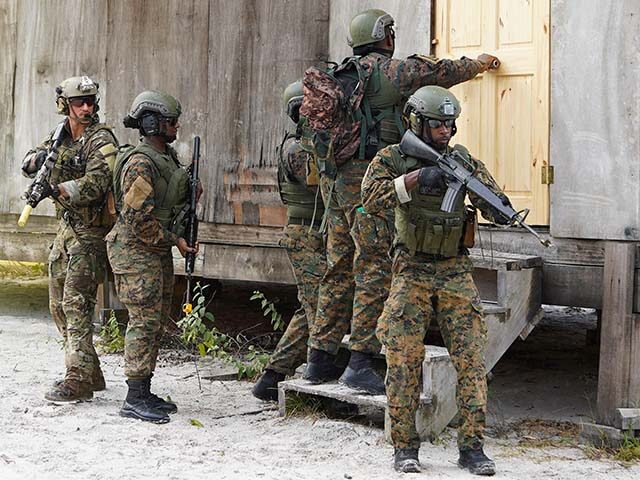CARACAS, Venezuela – The United States Southern Command (SOUTHCOM) conducted joint military flight drill operations with Guyana on Thursday, the first such operations since socialist Venezuela declared it would annex most of Guyana.
The joint operations with Guyana occurred less than a week after the Maduro regime held a sham referendum to annex the disputed Essequibo region, which represents about two-thirds of the current territory of Guyana. Socialist dictator Nicolás Maduro announced a list of actions on Tuesday that his regime will allegedly carry out to annex the territory and create a new state for Venezuela.
“This exercise builds upon routine engagement and operations to enhance security partnership between the United States and Guyana, and to strengthen regional cooperation,” the U.S. Embassy in Georgetown announced on Thursday. “In addition to this exercise, USSOUTHCOM will continue its collaboration with the GDF in the areas of disaster preparedness, aerial and maritime security, and countering transnational criminal organizations.”
“The U.S. will continue its commitment as Guyana’s trusted security partner and promoting regional cooperation and interoperability,” the statement concluded.
Venezuelan Defense Minister Vladimir Padrino López condemned the military exercises on Thursday, describing them as an “unhappy provocation.”
“This unhappy provocation by the United States in favor of ExxonMobil’s praetorians in Guyana is another step in the wrong direction, Padrino López wrote on Twitter. “We warn that we will not be diverted from our future actions for the recovery of the Essequibo, make no mistake, long live Venezuela!”
Esta infeliz provocación de Estados Unidos a favor de los pretorianos de la ExxonMobil en Guyana es otro paso en la dirección incorrecta. Advertimos que no nos desviarán de nuestras futuras acciones por la recuperación del Esequibo ¡No se equivoquen! ¡Viva Venezuela! pic.twitter.com/1UIfPNQODY
— Vladimir Padrino L. (@vladimirpadrino) December 7, 2023
Venezuela and Guyana maintain an over 120-year territorial dispute over two-thirds of Guyana’s current territory. Guyana has administered the contested Essequibo territory since 1899 following the results of an agreement that Venezuela has historically denounced as fraudulent long before the socialist Bolivarian Revolution’s rise to power in 1999.
Another agreement was signed in 1966 between Venezuela and the United Kingdom months before Guyana, at the time known as British Guiana, attained its independence. The 1966 agreement granted administrative control of the territory to Guyana until a permanent solution was found. No such definitive conclusion to the dispute failed to materialize.
Late dictator Hugo Chávez, as part of his plans to expand his regional influence, effectively froze Venezuela’s claim toof the territory, stating in 2004, “The Esequibo issue will be removed from the framework of the social, political and economic relations of the two countries.” Chávez promised at the time that his regime “will not oppose foreign companies exploring oil and gas fields in the disputed territory of Guyana.”
The dispute remained largely dormant until Guyana discovered oil and gas in the contested region’s waters in 2015. Guyana brokered several deals with oil companies to extract the newfound oil, including Houston-based ExxonMobil, which drew the ire of Maduro and his socialist regime. Maduro claims that ExxonMobil is part of a U.S. conspiracy to colonize South America.
In 2018, Guyana took the case of the Essequibo to the International Court of Justice (ICJ). The ICJ ruled in April that it has jurisdiction over the dispute. Although the ICJ is reportedly years away from issuing a final ruling, the Maduro regime has repeatedly insisted that it does not recognize the court’s jurisdiction on the matter and ignored an ICJ ruling issued last week that ordered Venezuela to refrain from “taking any action which would modify the situation that currently prevails in the territory in dispute.”
Maduro instead held a sham referendum vote to “ask” Venezuelans’ approval to annex the region. The Maduro regime claims that over 10.5 million Venezuelans “voted” in favor of annexation. The number of votes that Venezuelan electoral authorities claim were registered heavily contrasts with extensive footage taken across the country showing barren voting centers and idle poll workers.
Following the referendum, Maduro carried out arrests against anti-socialist dissidents on Wednesday afternoon, accusing them of “treason” and of being part of an alleged conspiracy financed by ExxonMobil.
Brazil, which shares its northern borders with both Venezuela and Guyana, has continued to reinforce its military presence at the border in the past week.
Celso Amorim, top foreign adviser to Brazilian radical leftist President Luiz Inácio Lula da Silva, said on Wednesday, “Brazil rejects any use of force by Venezuela to occupy the Essequibo territory in Guyana and will urge the Caracas government not to threaten its neighbor.” Brazilian Foreign Minister Mauro Vieira, however, dismissed the risk of an armed conflict in remarks given to Reuters.
Guyanese President Irfaan Alí described actions to annex Essequibo as a “direct threat” against his country. Following a formal request made by Guyana, the United Nations Security Council is scheduled to meet behind closed doors on Friday to discuss the growing tensions between Guyana and Venezuela.
U.S. Secretary of State Antony J. Blinken expressed the United States’ “unwavering support” to Guyana in a telephone conversation with President Alí on Wednesday, urging both countries to “respect the 1899 arbitral award determining the land boundary between Venezuela and Guyana, unless, or until, the parties reach a new agreement, or a competent legal body decides otherwise.”
Christian K. Caruzo is a Venezuelan writer and documents life under socialism. You can follow him on Twitter here.

COMMENTS
Please let us know if you're having issues with commenting.